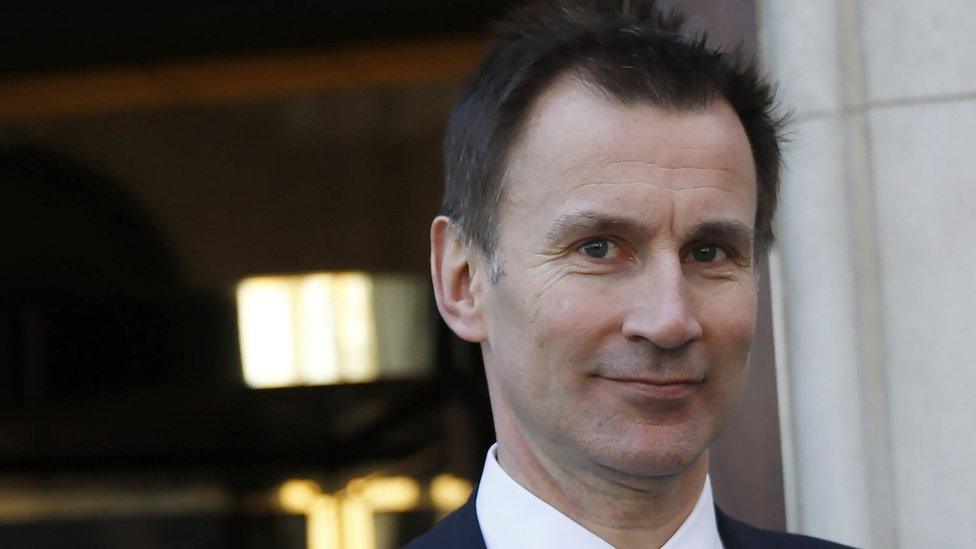Hunt 'misrepresented' data on 7-day NHS
- Published

Health Secretary Jeremy Hunt has been embroiled in a row over the use of data on seven-day services
The health secretary "misrepresented" data to put his case for a seven-day NHS in England, says Jeremy Corbyn.
The Labour leader attacked Jeremy Hunt after the BBC revealed the health secretary used academically unverified and unpublished data to back his plans.
Last July, in the pay row with junior doctors, Mr Hunt said there were about 6,000 deaths a year because of the lack of "a proper seven-day service".
But this assertion was later questioned by academics.
Emails show one of the authors of the unpublished paper, which Mr Hunt was using to justify the 6,000 figure, was unhappy with how his study was being used.
A spokesman said the information had been shared with the department by the NHS's medical director for England, Sir Bruce Keogh.
Labour is calling for an investigation into whether Mr Hunt leaned on his department in order to cover up his advance sight of the study.
Last July, Mr Hunt said: "Around 6,000 people lose their lives every year because we do not have a proper seven-day service in hospitals."
This figure was then used regularly by the government in its argument for changes to doctors' contracts.
The news prompted a heated clash in Prime Minister's Questions on Wednesday.
Labour leader Jeremy Corbyn said the prime minister and health secretary owed the profession an apology.
"This dispute with junior doctors has been on the basis of misrepresented research."
But David Cameron defended Mr Hunt, saying the contract was needed to introduce more seven-day services.
"I have to say - I think if Nye Bevan was here today, he'd want a seven-day NHS because he knew the NHS was for patients up and down our country," he added.
But Mr Corbyn hit back: "Nye Bevan would be turning in his grave if he could hear your attitude towards the NHS."
The BBC story revealed emails from NHS England showed Mr Hunt knew details of the sensitive study into weekend deaths at least two months before it was published in the British Medical Journal (BMJ), and based the 6,000 figure on his understanding of the data.
When the BBC asked NHS England and the Department of Health for the source of the 6,000 figure, neither was able to answer.
The UK Statistics Authority then wrote to NHS England, reminding the department that "data mentioned publicly by ministers should be available equally to all users".

An email released under the Freedom of Information Act, written by NHS England's Seven Day Services Forum project manager Deborah Williams to one of the BMJ study authors, said: "We were challenged to cite the source of the 6,000 figure and attempted to offer up the most bland statement possible, that would neither confirm not contradict [Mr Hunt's] statement."
The study author, Domenico Pagano, refused to corroborate Mr Hunt's use of the figures, saying: "It will be inaccurate and counterproductive to quote that our analysis is due to be published in the BMJ shortly, as this is not the case and may seem to interfere with the peer review process."
When finally published in September 2015, the research actually suggested there were 11,000 excess deaths per year as a result of the "weekend effect" - although the authors pointed out this could not be proven to be linked to staffing levels.
'Interests of patients'
A separate string of emails seen by the BBC under the Freedom of Information Act shows officials at Whitehall and NHS England then backtracked, using a combination of figures already in the public domain from 2009 and 2012 to attempt to provide an explanation for the 6,000 excess deaths claim. NHS England then published this in a "low-key fashion" on their website on 6 August.
One official at the Department of Health wrote to another at NHS England explaining the fudge, saying: "I am keen to avoid undue criticism of either [the Department of Health] or NHS England'.
NHS England has now admitted Mr Hunt had had advance sight of "headline figures" of the BMJ study prior to it being accepted for publication.
A spokesman said NHS medical director for England Sir Bruce Keogh and one of the study's authors alongside Dr Pagano, had shared some findings with "interested parties" including the Department of Health and the Review Body on Doctors' and Dentists' Remuneration (DDRB).
This is despite NHS England's Freedom of Information Officer saying in October last year: "Sir Bruce Keogh did not discuss the study's findings with anyone at the Department of Health at any point before or after the publication of this article."
NHS England now says this October statement is "clearly a mistake, and absurd" and Sir Bruce is "devastated" the focus has now shifted from "the issues of patient safety".
NHS England said: "The data on this topic has been consistent and it cannot be dismissed or ignored.
"We make no apology for using data and analysis to inform NHS and government policy in the best interests of patients."
A Department of Health spokesman said: "This 6,000 figure was NHS England's analysis. Subsequent independent clinical studies have shown further variation in the quality of care across the week, and more recent analysis makes clear there could actually be as many as 11,000 excess deaths owing to the 'weekend effect'."
Labour shadow health secretary Heidi Alexander said: "This is an extremely serious state of affairs given the weight attached to these figures by the health secretary in justifying changes to junior doctors' contracts.
"Rather than admitting the source of the figures, it seems that civil servants had to cobble together a post-hoc rationalisation for Jeremy Hunt's sound bites.
"There now needs to be a full investigation about whether pressure was put upon officials and whether the health secretary was involved."
- Published22 October 2015
